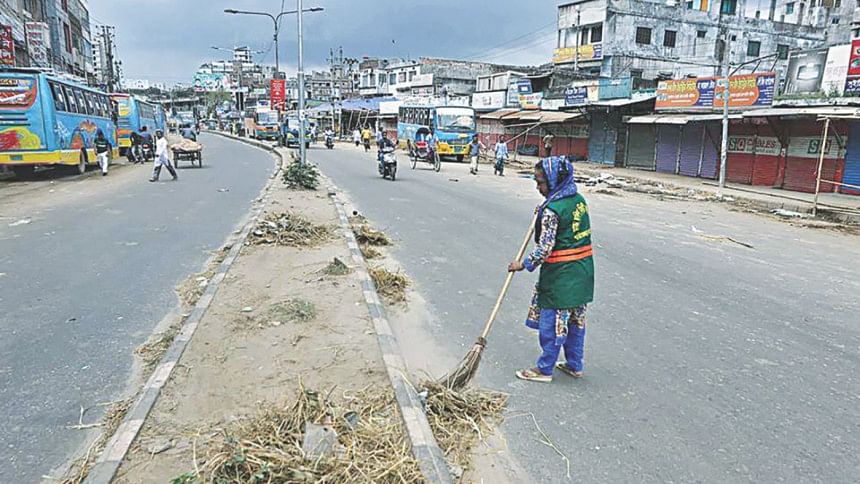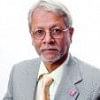An example to build on

Going overboard for even acquaintances, nationalism for the appropriate cause and at the right time, united in the face of any natural calamity, and indulging in innocent gossiping (read: harmless backbiting) are some of the finer points of a native Bangladeshi. We have been ridiculed for our short memory (Ekattur dubbed by the collaborator as golmaal), for being overtly talkative (this nation was made for talk shows) and jealous to the bone, suffering from recognition syndrome (somersault of the eyes), and haughtiness (upturned nose) after some success and attention.
There is often not much to dispute about the appreciation that many of us so richly deserve, but one major attribute missing from the directory of negatives is that we are basically an ungrateful nation, excruciatingly unappreciative and ungracious.
One may erroneously take solace in the fact that the alien phrase "thank you" has been adopted de facto as our own, but that is only because the Bangla equivalent dhonnobad sounds so foreign. We burn from deep inside our magma chamber, and are not accustomed to showering praise on another of our kind, in trepidation that it may make them feel good (or their relatives). When we are beholden, out of chokkhu lajja (apparent shyness) or in the hope of deriving further benefit in the immediate future, we manage to readily, even repeatedly, say "thank you". But dhonnobad (uhu!) is not that easy to utter.
Incidentally, Dhaka city of about 10 million is not easy to operate. About 140 countries of the world do not have as many people. Housing, water, electricity, gas, open areas and parks, roads, transport, and sewer are all in short supply. Citizens have the right to question the efforts of concerned authorities, but money too is perennially scarce. A little cooperation from us people would have gone a long way in helping the city operators help us. Cynics will perhaps justifiably pursue the line of unusual system loss, suggesting undeniable corruption, but one of the most densely populated areas in the world of about 400 sq km is that much of a challenge for those at the helm.
For instance, no time of the year is more challenging than Qurbani Eid when the seemingly impossible task of clearing about 25,000 tonnes of waste befalls the two Dhaka city corporations. In the city, reportedly half the cattle slaughtered throughout the year are sacrificed on a single day. Yet, amazingly the mammoth municipal job was done with aplomb by the city fathers and their bahini of more than 20,000 cleaners, and that too within 24 hours in many wards and by 48 hours in most. The logistics included hundreds of waste disposal vehicles, carrying out five to six trips each.
City residents, as in the previous years, continued to slaughter anywhere, leaving waste and blood everywhere—on the streets, in drains and in grounds of housing complexes. There was more discipline in some upscale housing areas, but in general, roads in residential areas were used for tethering the animals for two to three days, dirtied by their feed and waste, wrestling them to the pavement, slaughtering dead the animals and preparing the meat live in full view of others in queue. Some children give up eating meat after such a spectacle. Also, such killings when another animal is looking are makrooh in Islam; ironically, we were slaying the animals for religious goodness, to seek Allah's gratification and reward.
For several years now, the government has been designating spots locally for slaughtering to keep the city odour-free and hygienic, and so that the roads do not become "rivers of blood" as in 2016 after the rains. This year too there were more than 1,100 such locations under the two city corporations, but cooperation from the public was most discouraging. Poignantly, we, the people, like to keep our grounds and parking lots clean, and so the only choice is the road, not any city corporation earmarked site. Even if the slaughtering is done inside one's boundary, the washing is channelled into the open city drains.
One unresolved dilemma perhaps with designated slaughter areas was about preparing the meat at the place of slaughter and carrying the meat/animal after slaughter to the owner's premises. Would there be enough space to slaughter and prepare? Would the owners have to wait for long? Would some "influential" people break the queue?
Here's a proposal the mayors may consider. We appreciate the efforts of the DSCC and DNCC in designating slaughtering spots for Qurbani, but in the face of lack of motivation, perception, training and tested examples, people's apathy towards the scheme is also understandable. In the coming year, let the city corporations set up Pilot Slaughter Area (PSA), a few, say in five small wards, under the jurisdiction of each city corporation. Closely monitored by the corporation, none in the Pilot Wards would be allowed to slaughter outside a PSA. Depending on the success and the lessons acquired, and applying required modifications to the PSA, the project may be expanded gradually to include the entire city. The rest of the country shall follow suit.
Another possibility is the remote Qurbani, practised for long during Hajj. The Saudi Project for Utilization of Hajj Meat (ADAHI), established in 1983 and managed by the Islamic Development Bank (IDB), "meets all Shariah and health requirements, and ensures the cleanliness of the environment around the holy sites." Coupons to book a sacrifice are sold at counters and online to Hajis, none of who see the animal. Shariah supervisors execute ritualistic slaughter by butchers, overseen by veterinarians. The Haji is informed the time of his Qurbani while booking or is sent a text message that his Qurbani has been completed. The meat, again not available to the Haji, is distributed to beneficiaries in more than 25 countries, including Bangladesh.
A similar procedure has been carried out in a limited scale by some private companies in Dhaka over the past couple of years. The animal is slaughtered as per religious ritual. The meat is prepared, packaged and delivered to the client's address. Making use of modern abattoirs and waste disposal system should see this "clean" arrangement gaining ground in our cities in the future.
"Residents of the city haven't responded well. It's frustrating," Mayor Sayeed Khokon of DSCC had said referring to the mute response to the city corporations' arrangements. His disappointment is understandable. But, to his solace, his commitment that "Come rain or shine, the corporation will be able to clean the Qurbani waste within 24 hours" has been largely fulfilled. The city corporations deserve huge appreciation for the colossal task they undertook and for its satisfactory completion.
Dr Nizamuddin Ahmed is Vice Chancellor, BGMEA University of Fashion & Technology (BUFT), a practising architect, a Commonwealth Scholar and a Fellow, a Baden-Powell Fellow Scout Leader, and a Major Donor Rotarian.





Comments